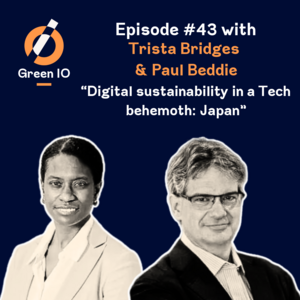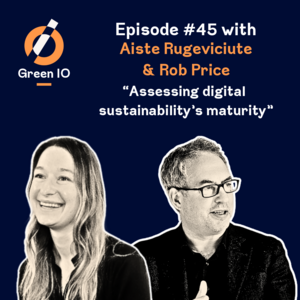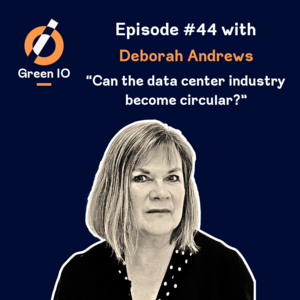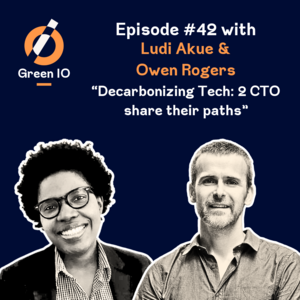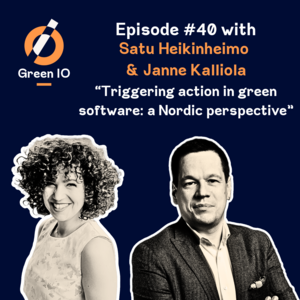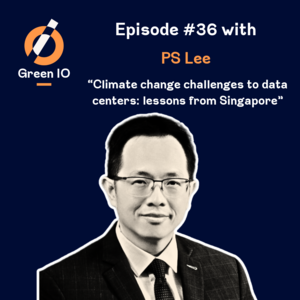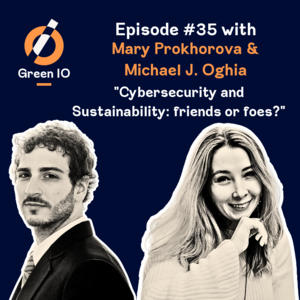#43 - Digital sustainability in a Tech behemoth: Japan with Trista Bridges and Paul Beddie
Update: 2024-07-16
Description
💭 How can a country defining itself as an high-tech spearheader can embrace IT sustainability? Japan is a fascinating example of both the contradictions and the synergies that such a journey creates.
🎙️ In this episode, Gael Duez welcomes two long-time Japan-based experts: Paul Beddie, VP and Sustainability Lead at Capgemini, and Trista Bridges, the co-author of Leading Sustainably, and a member of EcoVadis' Purpose Committee. Their exchange on IT sustainability initiatives in Japan led to many takeaways including:
🤝 the stakeholder-oriented nature of Japanese society,
🌱 the emergence of Japanese startups focusing on sustainability,
⚖️ the role of regulations in driving sustainability efforts in Japan,
And much more.
❤️ Subscribe, follow, like, ... stay connected the way you want to never miss an episode, twice a month, on Tuesday!
📧 Once a month, you get carefully curated news on digital sustainability packed with exclusive Green IO contents, subscribe to the Green IO newsletter here.
📣 Green IO London is on September 19th 2024 --> use the voucher GREENIOVIP to get a free ticket!
Learn more about our guest and connect:
📧 You can also send us an email at contact@greenio.com to share your feedback and suggest future guests or topics.
Trista and Paul's sources and other references mentioned in this episode:
- Digital Sustainably
- Capgemini
- EcoVadis
- Japan PM Suga vows goal of net zero emissions by 2050
- Together for Action: Japan’s Initiatives for Achieving the Common Goal of Net Zero by 2050
- JERA ends ammonia co-firing trial at coal power station with positive results
- JERA and ExxonMobil to Develop Low Carbon Hydrogen and Ammonia Production Project
Transcript
Gael Duez 00:00
Hello everyone. Welcome to Green IO, the podcast for responsible technologists building a greener digital world one byte at a time. Every two Tuesdays, our guests from across the globe share insights, tools and alternative approaches, enabling people within the tech sector and beyond to boost digital sustainability.
I must admit that this episode is a kind of a treat for me. I had such a big shock when I was a teenager and I started to discover Japanese culture. My first exposition being with the manga Akira, like many of people of my age, and that was pretty crazy back in the old days. But anyway, regarding sustainability and technology, actually, I started to realize a few years ago that I was wondering how a country which has built its reputation about being always the cutting edge innovator when it comes to high-tech, robotic, etcetera, etcetera, would be able to manage the wave or it's not necessarily a U-turn, but at least a significant change when embracing sustainability and approach things like low-carbon technology, or even sometimes low-tech or wise-tech or you name it the way you want. I'd rather prefer wise-tech as a combination of high-tech, low-tech and no-tech. So, I wanted to explore how this country is embracing sustainability and more specifically, IT sustainability. But to be honest, this won't be a very technical episode, it's more a geographical exploration.
And for this to happen, I'm delighted to have two experts on Japan on the show. The first one is Paul Beddie. He's actually one of the most vocal voices in Japan on sustainability at large. Not necessarily only IT sustainability, I think he publishes every day or every two days on LinkedIn. He's got crazy numbers of followers and he's well respected for this. But he also has an impressive track record holding executive positions in several IT companies such as Peoplesoft, Genpact, SAP, and now Capgemini, where he's now Vice President, Global Client Partner, and most importantly, Sustainability Lead.
Trista Bridges is the co-author of Leading Sustainably with Donald Eubank, and she has been in Japan for over ten years now, advising SME and startup about sustainability. She's also a member of the purpose committee of the EcoVadis, a famous ESG platform. So both guests are pretty knowledgeable in sustainability and in Japan. This is why I'm so delighted to have them today. Welcome, Trista. Welcome, Paul.
Paul Beddie 02:54
Thank you.
Trista Bridges 02:55
Hi. Thank you for having us.
Gael Duez 02:58
That's a pleasure. I think my first question for both of you will be exactly as I stated in the introduction, how is Japan embracing sustainability today? Maybe, Trista, you want to start?
Trista Bridges 03:13
It's a very interesting question because I've been looking at this topic for the last probably eight years or so. I kind of started writing the book with my co-author, Donald, about, gosh, it was about eight years ago now. And at that time, it was right after the SDGs were launched. And we kind of wrote the book because we were pretty fascinated with why we kept seeing the SDGs everywhere in Japan. But not used in a kind of, I think I would say in a serious way, but used in a very frivolous way in the beginning, right. You'd see, like, little posters and cutesy things and these types of things. But people really seemed to like the SDGs, which kind of stood in contrast to my home country, the US, where nobody really paid much attention. My adopted home country, France and Europe, where people respected it, but maybe weren't kind of living by it as kind of the code of sustainability, per se. And so at that time, you know, Japan really wasn't doing that much. Although I would say that the lifestyle of Japan in some ways incorporates a lot of elements of sustainability, right? You know, it's a chain of islands who for a long time don't have any resources, so have always had to kind of look at things like recycling, for example. There's a very kind of sophisticated recycling system, for example. But, you know, if you looked at a lot of the elements of the SDGs, whether it be climate or other things, you know, Japan was definitely not kind of at the forefront of those things. But then that started to change, and you probably remember, you may or may not remember, there was a prime minister, Prime Minister Suga. He basically committed to net-zero for Japan, 2050, I think that was in 2021, perhaps. And then we had Prime Minister Kushida, who came in and he kind of continued in that same vein. And you started to see in the last, I'd say, two or three years or so, you're seeing a lot of momentum around this topic, particularly around ESG and we can talk later about different regulations and these types of things that are kind of coming into play. But I'd say at the moment, Japan, there's a lot of momentum around this topic. But does Japan have a long way to go? Absolutely. And there's a lot of different structural and historical reasons for that that we can dig into during the discussion.
Gael Duez 05:31
Oh, and we will. Paul, you might want to bounce back on this.
Paul Beddie 05:37
Sure. I'll add a little bit more color as to what Trista just said, by the way. It's great to be on with you, Trista. I know when I came back to Japan for the third time in 2020 from China, your book, and you and Donald were some of the first people I met when I came back to Japan to plug into the sustainability community here. So, it's great to be on the call with you. Some of the things that I know, I mean, in Japan, we have the SGD train. Some of the subways are totally plastered. SDGs. SDGs. Everybody in Japan is wearing the beautiful multicolored pen. They're saying, look, we're all for the SGDs. You go to every construction site around Tokyo, they've all got a huge billboard out in front of the building that they're building, the 40-storey steel ginormous building with tons of concrete, that they're very concerned about SGDs, and they knocked down perfectly good buildings to build those. So it's a really interesting place. They give a lot of lip service but I have to say, I'm not sure that Japan really understands what it needs to do to really become sustainable. The odds of it actually hitting the goals that the government's put out by 2030, in my opinion, are very low. But it's interesting. I actually came to Japan initially in 1991, and worked for a very large Japanese engineering company. Very unusual experience. I was the only foreigner in their global sales development group, in their inaugural environmental business development company, selling scrubbers to coal fired power plants. And when it comes to hardware, and this is really typical for Japan, their hardware excels. This is a country of mechanical civil engineers
Hello everyone. Welcome to Green IO, the podcast for responsible technologists building a greener digital world one byte at a time. Every two Tuesdays, our guests from across the globe share insights, tools and alternative approaches, enabling people within the tech sector and beyond to boost digital sustainability.
I must admit that this episode is a kind of a treat for me. I had such a big shock when I was a teenager and I started to discover Japanese culture. My first exposition being with the manga Akira, like many of people of my age, and that was pretty crazy back in the old days. But anyway, regarding sustainability and technology, actually, I started to realize a few years ago that I was wondering how a country which has built its reputation about being always the cutting edge innovator when it comes to high-tech, robotic, etcetera, etcetera, would be able to manage the wave or it's not necessarily a U-turn, but at least a significant change when embracing sustainability and approach things like low-carbon technology, or even sometimes low-tech or wise-tech or you name it the way you want. I'd rather prefer wise-tech as a combination of high-tech, low-tech and no-tech. So, I wanted to explore how this country is embracing sustainability and more specifically, IT sustainability. But to be honest, this won't be a very technical episode, it's more a geographical exploration.
And for this to happen, I'm delighted to have two experts on Japan on the show. The first one is Paul Beddie. He's actually one of the most vocal voices in Japan on sustainability at large. Not necessarily only IT sustainability, I think he publishes every day or every two days on LinkedIn. He's got crazy numbers of followers and he's well respected for this. But he also has an impressive track record holding executive positions in several IT companies such as Peoplesoft, Genpact, SAP, and now Capgemini, where he's now Vice President, Global Client Partner, and most importantly, Sustainability Lead.
Trista Bridges is the co-author of Leading Sustainably with Donald Eubank, and she has been in Japan for over ten years now, advising SME and startup about sustainability. She's also a member of the purpose committee of the EcoVadis, a famous ESG platform. So both guests are pretty knowledgeable in sustainability and in Japan. This is why I'm so delighted to have them today. Welcome, Trista. Welcome, Paul.
Paul Beddie 02:54
Thank you.
Trista Bridges 02:55
Hi. Thank you for having us.
Gael Duez 02:58
That's a pleasure. I think my first question for both of you will be exactly as I stated in the introduction, how is Japan embracing sustainability today? Maybe, Trista, you want to start?
Trista Bridges 03:13
It's a very interesting question because I've been looking at this topic for the last probably eight years or so. I kind of started writing the book with my co-author, Donald, about, gosh, it was about eight years ago now. And at that time, it was right after the SDGs were launched. And we kind of wrote the book because we were pretty fascinated with why we kept seeing the SDGs everywhere in Japan. But not used in a kind of, I think I would say in a serious way, but used in a very frivolous way in the beginning, right. You'd see, like, little posters and cutesy things and these types of things. But people really seemed to like the SDGs, which kind of stood in contrast to my home country, the US, where nobody really paid much attention. My adopted home country, France and Europe, where people respected it, but maybe weren't kind of living by it as kind of the code of sustainability, per se. And so at that time, you know, Japan really wasn't doing that much. Although I would say that the lifestyle of Japan in some ways incorporates a lot of elements of sustainability, right? You know, it's a chain of islands who for a long time don't have any resources, so have always had to kind of look at things like recycling, for example. There's a very kind of sophisticated recycling system, for example. But, you know, if you looked at a lot of the elements of the SDGs, whether it be climate or other things, you know, Japan was definitely not kind of at the forefront of those things. But then that started to change, and you probably remember, you may or may not remember, there was a prime minister, Prime Minister Suga. He basically committed to net-zero for Japan, 2050, I think that was in 2021, perhaps. And then we had Prime Minister Kushida, who came in and he kind of continued in that same vein. And you started to see in the last, I'd say, two or three years or so, you're seeing a lot of momentum around this topic, particularly around ESG and we can talk later about different regulations and these types of things that are kind of coming into play. But I'd say at the moment, Japan, there's a lot of momentum around this topic. But does Japan have a long way to go? Absolutely. And there's a lot of different structural and historical reasons for that that we can dig into during the discussion.
Gael Duez 05:31
Oh, and we will. Paul, you might want to bounce back on this.
Paul Beddie 05:37
Sure. I'll add a little bit more color as to what Trista just said, by the way. It's great to be on with you, Trista. I know when I came back to Japan for the third time in 2020 from China, your book, and you and Donald were some of the first people I met when I came back to Japan to plug into the sustainability community here. So, it's great to be on the call with you. Some of the things that I know, I mean, in Japan, we have the SGD train. Some of the subways are totally plastered. SDGs. SDGs. Everybody in Japan is wearing the beautiful multicolored pen. They're saying, look, we're all for the SGDs. You go to every construction site around Tokyo, they've all got a huge billboard out in front of the building that they're building, the 40-storey steel ginormous building with tons of concrete, that they're very concerned about SGDs, and they knocked down perfectly good buildings to build those. So it's a really interesting place. They give a lot of lip service but I have to say, I'm not sure that Japan really understands what it needs to do to really become sustainable. The odds of it actually hitting the goals that the government's put out by 2030, in my opinion, are very low. But it's interesting. I actually came to Japan initially in 1991, and worked for a very large Japanese engineering company. Very unusual experience. I was the only foreigner in their global sales development group, in their inaugural environmental business development company, selling scrubbers to coal fired power plants. And when it comes to hardware, and this is really typical for Japan, their hardware excels. This is a country of mechanical civil engineers
Comments
Top Podcasts
The Best New Comedy Podcast Right Now – June 2024The Best News Podcast Right Now – June 2024The Best New Business Podcast Right Now – June 2024The Best New Sports Podcast Right Now – June 2024The Best New True Crime Podcast Right Now – June 2024The Best New Joe Rogan Experience Podcast Right Now – June 20The Best New Dan Bongino Show Podcast Right Now – June 20The Best New Mark Levin Podcast – June 2024
In Channel

